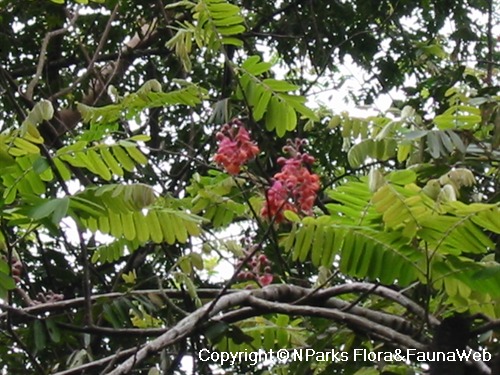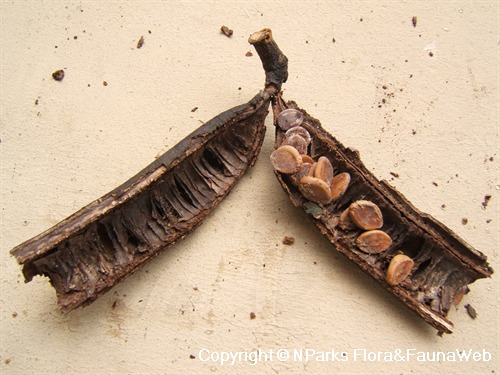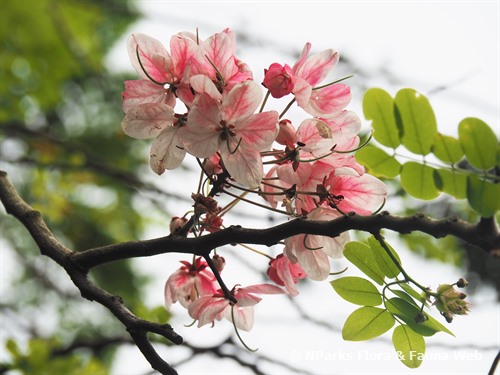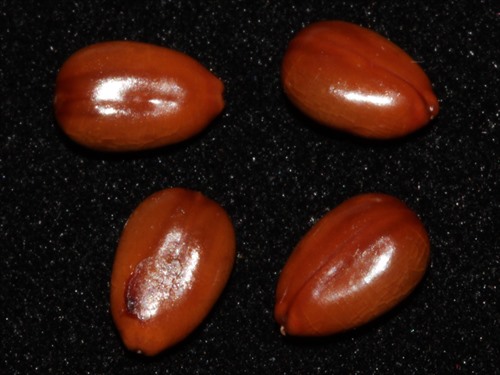_lowres.jpg)
Back
Cassia grandis L. f.
| Family Name: | Fabaceae (Leguminosae) |
| Synonyms: | Bactyrilobium grande (L.f.) Hornem., Cathartocarpus grandis (L.f.) Pers., Cassia pachycarpa de Wit |
| Common Name: | Horse Cassia, Kotek, Kotek Mamak, Apple-blossom Cassia, Pink Cassia, Pink Shower Tree, Coral Shower, Horse Shower, Liquorice Tree, Carao, Stinking Toe, 大果铁刀木 |
Name
Classifications and Characteristics
| Plant Division | Angiosperms (Flowering Seed Plants) (Dicotyledon) |
|---|---|
| Plant Growth Form | Tree (Medium (16m-30m)) |
| Lifespan (in Singapore) | Perennial |
| Mode of Nutrition | Autotrophic |
| Plant Shape | Umbrella |
| Maximum Height | 15 m to 25 m |
| Tree or Palm – Trunk Diameter | 0 |
Biogeography
| Native Distribution | Tropical America |
|---|---|
| Native Habitat | Terrestrial (Riverine) |
| Preferred Climate Zone | Tropical |
| Local Conservation Status | Non-native |
Description and Ethnobotany
| Growth Form | Semi-deciduous, medium-sized tree with an umbrella-shaped canopy. This species sheds it leaves during the dry season in Northern Malaysia. |
|---|---|
| Trunk | Straight trunk reaches 0.6 m wide at maturity. Bark is smooth and light grey. |
| Foliage | Alternate leaves (30 cm long, 10 cm wide) are pinnately compound with 10 - 20 pairs of leaflets. Leaflets are elliptic to oblong with rounded tips (4 cm long, 1.5 cm wide). They are green and slightly hairy on top, but reddish purple on the underside. |
| Flowers | Flowers consist of 5 light purple sepals and 5 pinkish petals (3 cm long). Petals are red at first, but gradually become pink and then peach. They are irregular in size, slightly cup-shaped and arranged like a star. The inflorescence is an axillary raceme, with flowers borne on short stalks off one long main axis. |
| Fruit | Fruits are long cylindrical woody pods that may be slightly curved (> 40 cm long, 5 - 6 cm wide). The pods contain a pungent, sticky liquid that creates a foul smell when the pods fall to the ground and eventually break open. |
| Others - Plant Morphology | Propagation: Propagate by seed, cuttings or layering. Seed surface should be nicked to promote germination. This species produces suckers which can also be replanted. |
| Habitat | Occurs in semi-deciduous forests at low altitudes (0 - 600 m). Found along rivers and on hillsides. |
| Cultivation | Trees should be pruned regularly. This species is susceptible to bruchid beetles which attack the seeds. |
| Etymology | The genus "Cassia" is Latin for a plant similar to cinnamon. The species epithet "grandis" is Latin for large. It refers to the tall stature of this species. |
| Ethnobotanical Uses | Food (Herb or Spice) Others: Food: The seed membrane can be processed into a chocolate-like dessert. Medicine: The pod contains a foul-smelling liquid with honey-like consistency. It is mixed with milk as a treatment for anemia, because it is rich in iron. The fruit pulp, mature pods and seeds may be consumed as a laxative. Other: The pods can be used as cattle feed. The timber is strong and used for building construction. |
Landscaping Features
| Desirable Plant Features | Ornamental Flowers |
|---|---|
| Landscape Uses | General, Focal Plant |
Fauna, Pollination and Dispersal
| Seed or Spore Dispersal | Abiotic (Gravity) |
|---|
Plant Care and Propagation
| Light Preference | Full Sun |
|---|---|
| Water Preference | Moderate Water |
| Plant Growth Rate | Moderate |
| Rootzone Tolerance | Fertile Loamy Soils, Well-Drained Soils |
| Propagation Method | Seed, Stem Cutting, Air-Layering |
Foliar
| Foliage Retention | Drought / Semi-Deciduous |
|---|---|
| Mature Foliage Colour(s) | Green, Purple |
| Mature Foliage Texture(s) | Hairy / Hirsute |
| Foliar Arrangement Along Stem | Alternate |
| Foliar Shape(s) | Non-Palm Foliage (Elliptical, Oblong) |
| Foliar Venation | Pinnate / Net |
| Foliar Margin | Entire |
| Foliar Apex - Tip | Rounded |
| Foliar Base | Rounded / Obtuse |
| Typical Foliar Area | Macrophyll ( 182.25cm2 - 1640.25 cm2 ) |
| Leaf Area Index (LAI) for Green Plot Ratio | 2.5 (Tree - Open Canopy) |
Non - Foliar and Storage
| Trunk Type (Non Palm) | Woody |
|---|---|
| Bark Colour(s) | Light grey |
| Mature Bark Texture | Smooth |
| Root Type | Underground (Tap Root) |
Floral (Angiosperm)
| Flower & Plant Sexuality | Bisexual Flowers |
| Flower Colour(s) | Orange, Pink, Red |
|---|---|
| Flower Symmetry | Asymmetrical |
| Individual Flower Shape | Stellate / Star-shaped |
| Inflorescence Type | Raceme |
| Flowering Habit | Polycarpic |
| Inflorescence Size Remarks | Red --> Pink --> Peach |
Fruit, Seed and Spore
| Mature Fruit Colour(s) | Brown |
|---|---|
| Fruit Classification | Simple Fruit |
| Fruit Type | Indehiscent Dry Fruit |
Image Repository
Others
| Master ID | 1495 |
|---|---|
| Species ID | 2788 |
| Flora Disclaimer | The information in this website has been compiled from reliable sources, such as reference works on medicinal plants. It is not a substitute for medical advice or treatment and NParks does not purport to provide any medical advice. Readers should always consult his/her physician before using or consuming a plant for medicinal purposes. |

_lowres.jpg)
_lowres.jpg)







